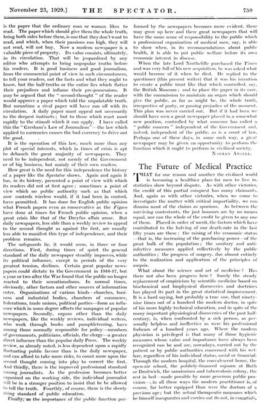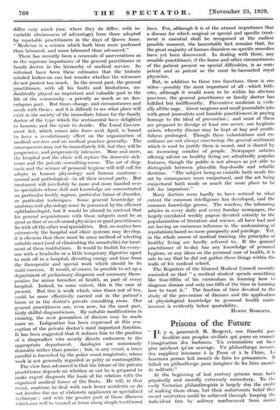The Future of Medical Practice T HAT for one reason and
another the civilized world is becoming a healthier place for men to live in, statistics show beyond dispute. As with other victories, the credit of this partial conquest has many claimants. And, again as with other victories, when we come to investigate the matter with critical impartiality, we can dismiss most of the claims as spurious. As between the surviving contestants, the just honours are by no means equal, nor can the whole of the credit be given to any one of them. Placed in order of merit, the factors which have contributed to the halving of our death-rate in the last fifty years are these : the raising of the economic status- -that is, the increasing of the purchasing power—of the great bulk of the population ; the sanitary and anti- infective measures applied collectively by the public authorities ; the progress of surgery, due almost entirely to the realization and application of the principles of asepsis.
What about the science and art of medicine ? Has there not also been progress here ? Surely the steady replacement of empiricism by scientific medicine based on biochemical and biophysical discoveries and doctrines has played its part in the great statistical improvement. It is a hard saying, but probably a true one, that ninety- nine times out of a hundred the modern doctor, in spite of his more highly technical education, and in spite of the many important physiological discoveries of the past half- century, is, when confronted by a sick person, as per- sonally helpless and ineffective as were his professional forbears of a hundred years ago. Where the modern physician is privileged is that many of those hygienic measures whose value and importance have always been recognized-can be and are, nowadays, carried out by the patient or by public authorities concerned with his wel- fare, regardless of his individual status, social or financial. Through the modern hospital, the convalescent home, the open-air school, the publicly-financed sojourn at Bath or Droitwieh, the sanatorium and tuberculosis colony, the rest in beCI-made possible by more generous public pro- vision—, in all these ways the modern practitioner is, of course, far better- equipped than were the doctors of a previous age; but the actual therapeutic measures which he himself- inaugurates and carries out do not, in essentials, differ very much (nor, where they do differ, with in- variable obviousness of advantage) from those adopted by reputable practitioners in the days of Queen Anne. " Medicine is a science which bath been more professed than laboured, and more laboured than advanced."
There has recently been a crescendo of asseverations as to the supreme importance of the general practitioner or family doctor in the hierarchy of medical service. So reiterant have been these estimates that the historic minded looker-on can but wonder whether the witnesses do not protest too much. In the recent past, the general practitioner, with all his faults and limitations, un- doubtedly played an important and valuable part in the life of the community—a priestly as much as an Aes- culapian part. But times change, and circumstances and needs with them ; and it is difficult to see what place will exist in the society of the immediate future for the family doctor of the type which the sentimental have delighted to honour, and the cynic to deride. The Local Govern- ment Act, which comes into force next April, is bound to have a revolutionary effect on the organization of medical services and on medical practice generally. The consequences may not be immediately felt, but they will be progressive, and progressively intensive. More and more, the hospital and the clinic will replace the domestic sick- room and the private consulting-room. The art of diag- nosis and the science of personal hygiene will still call for adepts in human physiology and human anatomy— normal and pathological—in all their several parts. But treatment will inevitably be more and more handed over to specialists whose skill and knowledge are concentrated on particular bodily regions, particular forms of disorder, or particular techniques. Some general knowledge of anatomy and physiology must be possessed by the efficient ophthalmologist, but it would be absurd to contend that his general acquaintance with these subjects need be as great as that of an all-round physician or good practitioner. So with all the other real specialities. But, no matter how extensively the hospital and clinic systems may develop, it is obvious that there must be some method of selecting suitable cases (and of eliminating the unsuitable) for treat- ment at these institutions. It would be foolish for every- one with a .headache or a little temporary digestive upset to rush off to a hospital, diverting energy and time from the therapeutic and special work which should be its main concern. It would, of course, be possible to set up a department of preliminary diagnosis and summary thera- peutics for minor breaches of health, as part of every hospital. Indeed, to some extent, this is the case at present. But this is work which, nine times out of ten, could be more effectively carried out in the patient's home or in the doctor's private consulting room. Our general practitioners are, even now, for the most part, fairly skilful diagnosticians. By suitable modifications in training, the next generation of doctors may be made more so. Indignation has been expressed at this con- ception of the private doctor's most important function. It has been suggested that it reduces him to the position of a shopwalker who merely directs customers to the appropriate department. Analogies are notoriously dramatic rather than precise ;. but, in any event, a truer parallel is furnished by the police court magistrate, whose work is not generally regarded as petty or contemptible.
The view here advanced is that the future of the private practitioner depends on whether or not be is prepared to make expert. diagnosis. the basis of his relation with the organized medical forces of the State. He will, in that event, continue to deal with such. lesser accidents as do not involve the use of elaborate appliances or specialized technique ; and with the greater part of those illnesses which can well be treated at home along simple traditional lines. For, although it is of the utmost importance that a disease for which surgical or special and specific treat- ment is essential shall be recognized at the earliest possible moment, the lamentable fact remains that, for the great majority of human disorders no specific remedies have yet been discovered. In dealing with these, any sensible practitioner, if the home and other circumstances of the patient present no special difficulties, is as com- petent and as potent as the most be-baroneted royal physician.
But, in addition to these two functions, there is one other—possibly the most important of all—which hith- erto, although it would seem to be within his obvious province, the general practitioner or family doctor has fulfilled but indifferently. Preventive medicine is verb- ally all the rage. Great surgeons and small journalists join with great journalists and humble practitioners in paying homage to the ideal of prevention ; and most of them are prepared to divulge at least one secret, one hygienic axiom, whereby disease may be kept at bay and youth- fulness prolonged. Though these exhortations and ex- ordiums are not always convincing, the general sentiment which is used to justify them is sound, and is shared by an increasing number of people. Newspaper articles offering advice on healthy living are admittedly popular features, though the public is not always as yet able to distinguish between plausible flap-doodle and reliable doctrine. "The subject being so variable hath made the art by consequence more conjectural, and the art being conjectural bath made so much the more place to be left for imposture."
Many doctors seem hardly to have noticed to what extent the common intelligence has developed, and the common knowledge grown. The wireless, the informing articles in every daily and every Sunday newspaper, the largely circulated weekly papers devoted entirely to the popularization of literature and science, all have had and are having an enormous influence in the undermining of reputations based on mere pomposity and privilege. Yet, in the whole course of medical training, the principles of healthy living are hardly referred to. If the general practitioner of to-day has any knowledge of personal hygiene, or any ideas on the personal care of health, it is safe to say that he did not gather these things within the walls of his medical school.
The Registrar of the General. Medical Council recently reminded us that " a medical student spends something like four-fifths of his curriculum in learning how to diagnose disease and only one fifth of the time in learning how to treat it." The fraction of time devoted to the study of the prevention of diseases and the application of physiological knowledge to personal health main- tenance is evidently below quotability.
HARRY ROBERTS.































































 Previous page
Previous page